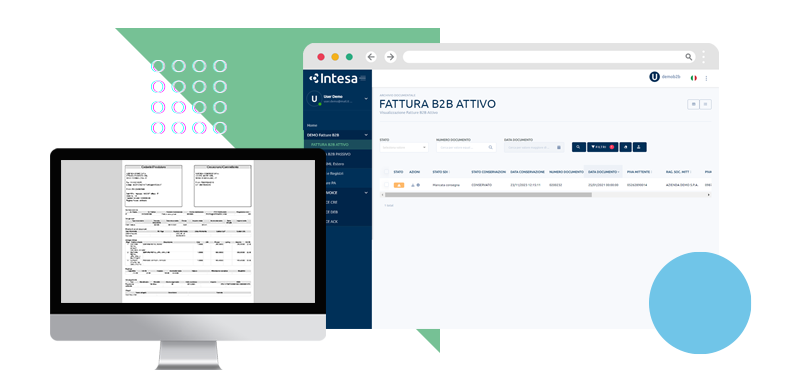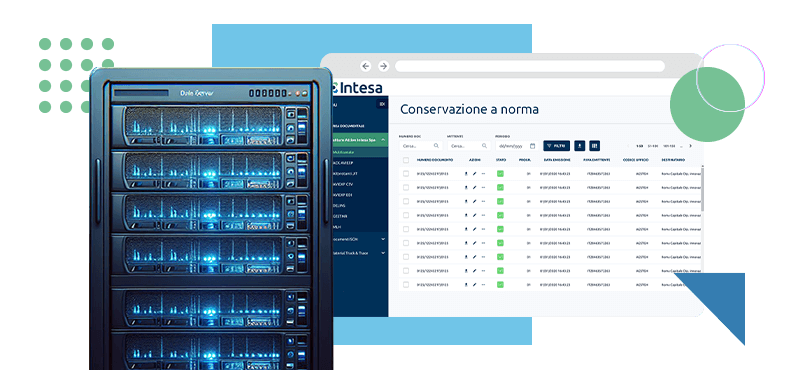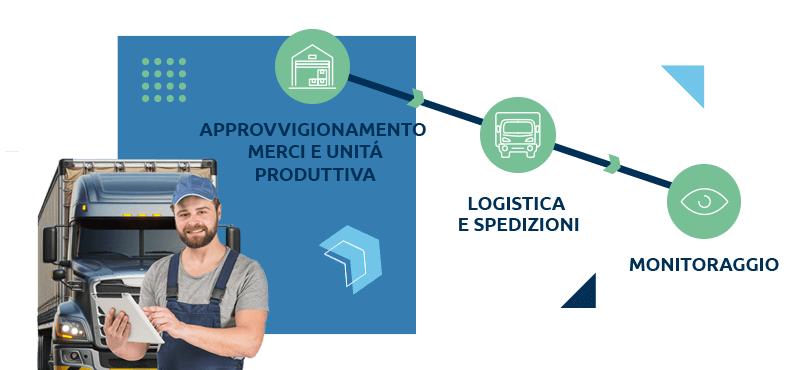Electronic Data Interchange (EDI) is the standardized electronic transfer of commercial information. This technology enables a company to send data to another company or partner in digital format rather than on paper.
EDI – Electronic Data Interchange
Intesa’s Electronic Data Interchange (EDI) application automates supply chain processes and enhances business relationships with partners distributed worldwide.
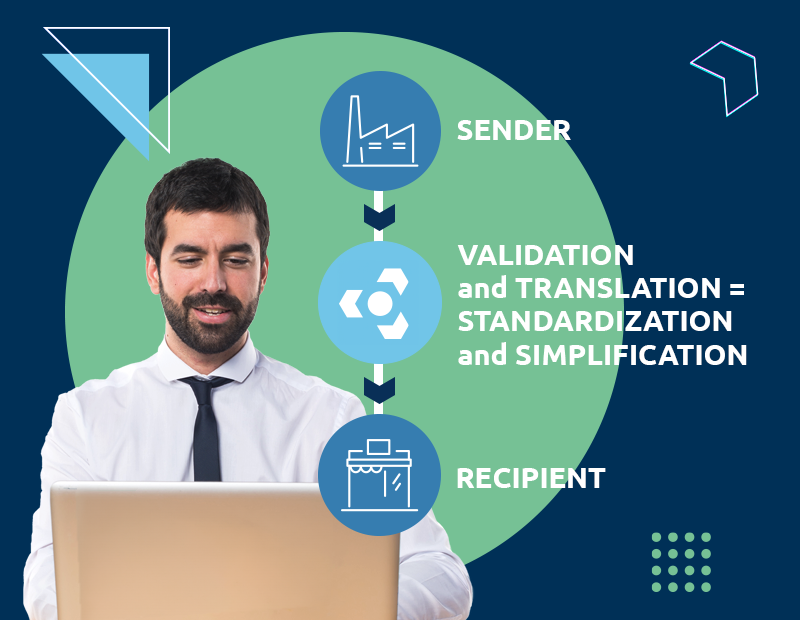

What do our customers think about the EDI solution?
How EDI works: a simple overview
Electronic Data Interchange (EDI) is based on message standards and requires careful data governance for proper functionality. Standards such as ODETTE, TRADACOMS, GS1, Peppol, and ASC X12 form the foundation of EDI conversations. There are two main ways to transmit data via EDI: point-to-point connections, where two systems connect directly over the internet, and Value-Added Networks (VANs), where third parties manage data transmission.
Transmission protocols include SFTP, AS2 (based on HTTPS), SOAP, and others. EDI data contains elements such as sender and recipient IDs, which are combined into segments to convey meaning. The EDI message flow describes how data moves between addresses and departments to execute business transactions. XML and JSON integrate with EDI rather than replacing it. Companies need to manage various document formats and transmission options.
By choosing Intesa’s EDI service, you can also activate the Control Tower service to have a real-time overview of supply chain operations.
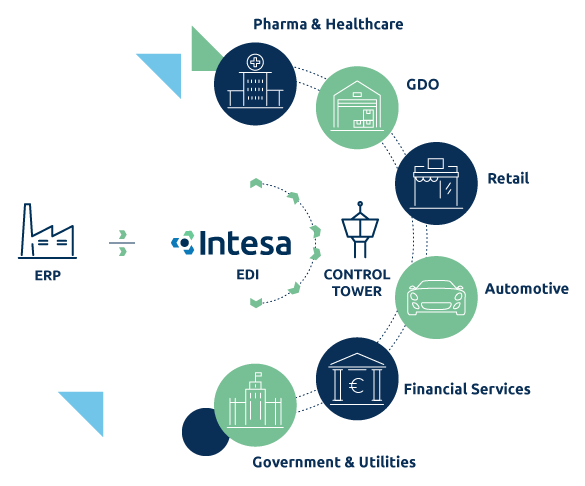
The benefits of the EDI system
Time and cost savings
Automate manual processes, reducing costs associated with handling paper documents.
Efficiency and productivity
Share and process more documents in less time with increased precision, enhancing operational efficiency.
Error reduction
Standardize processes and decrease errors, ensuring correct formatting before integration into business processes.
Traceability and reporting
Improve traceability, visibility, and data analysis by integrating electronic documents with IT systems.
Intesa Hive, a single control center for all your business documents
Discover Intesa Hive, the platform that lets you monitor all your business documents from a single interface—whether they come from EDI services, long-term compliant archiving, or e-invoicing.
EDI system features
The features of the Electronic Data Interchange (EDI) are designed to facilitate the electronic exchange of information between businesses, improving efficiency, accuracy, and the speed of commercial transactions.
1. Standardization
EDI uses standardized message formats that define the structure and content of data. This ensures that data is consistent and understandable for all business partners, reducing interpretation errors.
2. Process automation
EDI automates numerous business processes, such as the creation, sending, and receiving of orders, invoices, delivery confirmations, and other commercial documents. This reduces the need for manual interventions, speeding up workflows.
3. Paperless exchange
EDI eliminates the need for paper documents, such as printed orders or invoices, which require time and resources for preparation and shipping. Electronic documents are exchanged between computer systems, improving efficiency and environmental sustainability.
4. Integration with ERP systems
EDI easily integrates with the Enterprise Resource Planning (ERP) systems of companies, enabling smooth data sharing between internal and external systems. This simplifies information management and process monitoring.
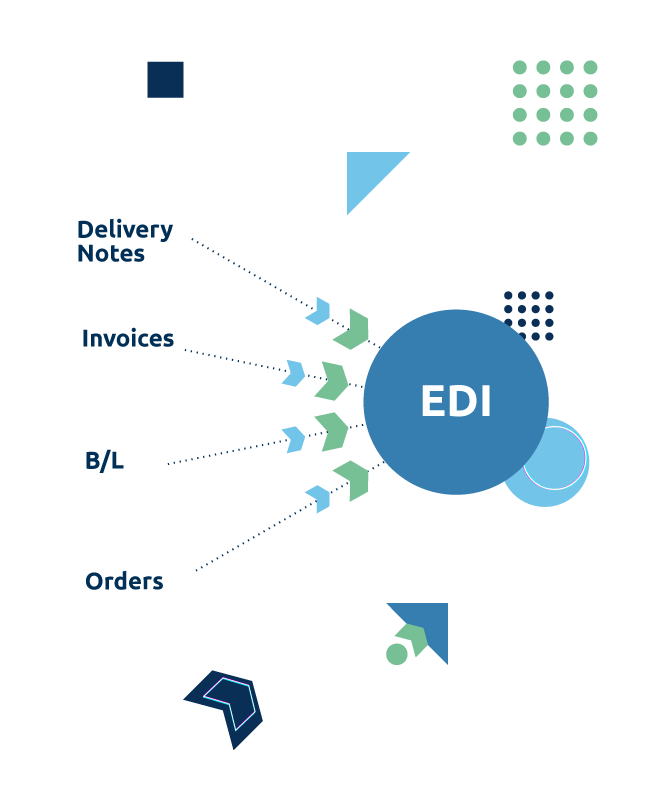
With EDI, you always have everything under control
Our professionals will support your company in implementing the Electronic Data Interchange service, providing numerous benefits.
Traceability and Visibility
EDI offers detailed traceability of transactions, allowing companies to monitor the real-time status and location of documents. This helps identify any issues and make informed decisions.
Transaction Speed
EDI accelerates document processing times, enabling companies to complete transactions more quickly. This is particularly helpful in meeting the needs of business partners and reducing waiting times.
Regulatory compliance
EDI supports standard business practices and industry regulations. This helps companies comply with regulatory requirements and maintain accurate and well-documented records.
International Support
EDI facilitates data exchange between companies worldwide, easing international trade and enabling the management of various languages, currencies, and regulations.
Request a free consultation
Do you want to understand if this solution suits your needs? Our team of consultants is available to answer all your questions without any obligation.
A comprehensive and innovative EDI service
In today’s business landscape, process automation and operational cost reduction are primary objectives for companies. While various solutions are available in the market to meet these needs, the true discernment lies in achieving maximum efficiency.
This is why an increasing number of businesses rely on IT solutions for the electronic transmission of data with global partners, aiming to enhance data quality and gain a relevant and lasting competitive advantage.
Intesa was founded 35 years ago by IBM and Fiat specifically to manage document exchanges among Italian manufacturing companies. This positions us to support you in the phases of EDI integration with partners in any market, including Grocery, Automotive, Pharma, Retail, and Manufacturing.
• Connect Partners
• Synchronize Data
• Manage Orders
• Optimize Document Flows.


L’EDI driving to pole position
Intesa has implemented a solution for Sabelt to exchange data with partners via EDI.
Frequently Asked Questions about EDI
1. How can EDI improve the efficiency of business processes?
2. What are the most common business documents exchanged through EDI?
3. What are the benefits of using EDI for international business relationships?
4. How can I determine if my business partners are ready to implement EDI?
5. What are the key factors to consider when choosing an EDI solution suitable for my company?
6. Are there volume limits for document exchange to consider in an EDI project?
7. If my business partners do not have an ERP system, is it still possible to start an EDI project with them?
8. Is it feasible to exchange documents with international partners through EDI?
9. How much does an EDI solution cost?
We are at your service
The Intesa team consists of professionals who are reliable and have extensive experience in various market sectors. Do you have any questions? Would you like to schedule a free and no-obligation consultation call? Fill out the form on the side with your request or simply let us know what you need. We will get back to you as soon as possible.
News and updates on electronic data interchange (EDI)

Regulations
03.02.2025
Qualified e-Archiving: a guide to the new Qualified Digital Archiving
Discover what Qualified e-Archiving is, its implications, and how to implement it according to the eIDAS 2.0 regulation for secure and compliant digital archiving.
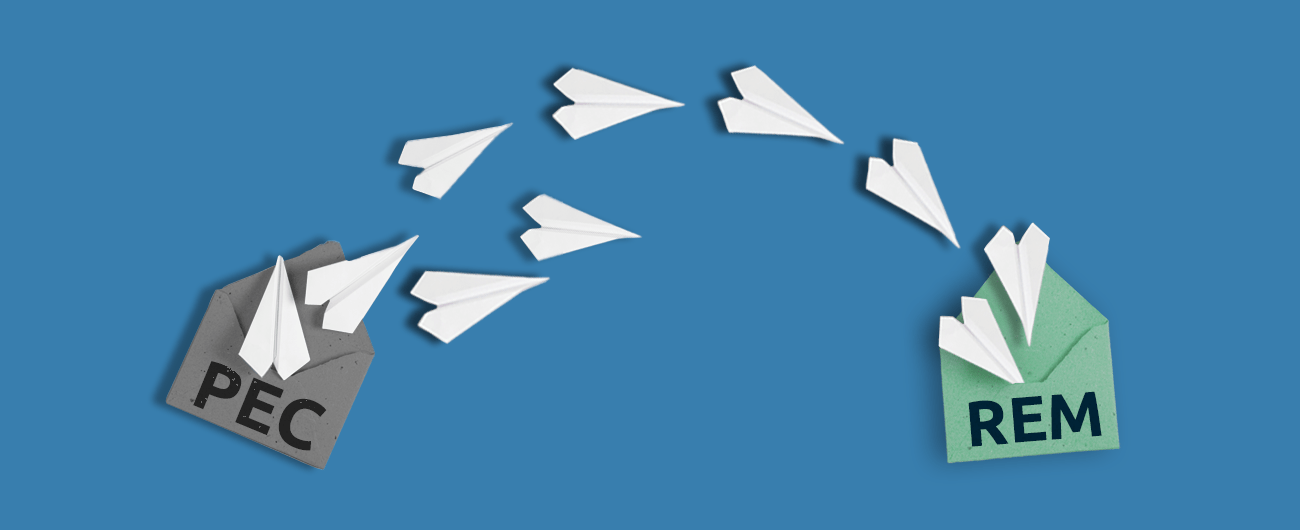
Regulations
03.02.2025
REM Certified Email: the new european standard for secure communications
Certified Electronic Mail (PEC) will be replaced by Registered Electronic Mail (REM), a new European standard for secure communications, which will ensure greater interoperability and…

Regulations
03.02.2025
EPREL and the Electronic Seal: how to obtain and apply it
Manufacturers and distributors of electronic equipment will be required to apply the qualified electronic seal on the EPREL portal. Let’s explore what the Qe-Seal is…


